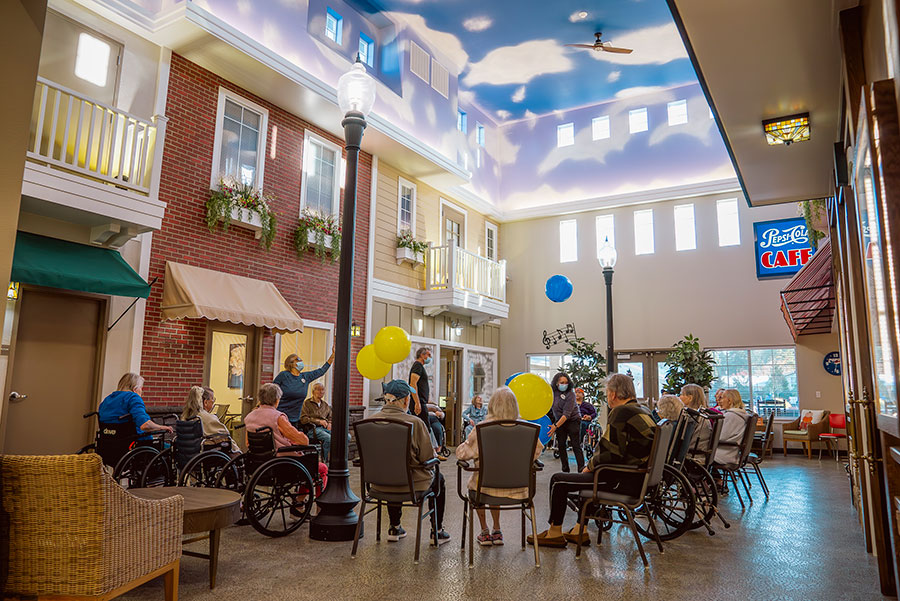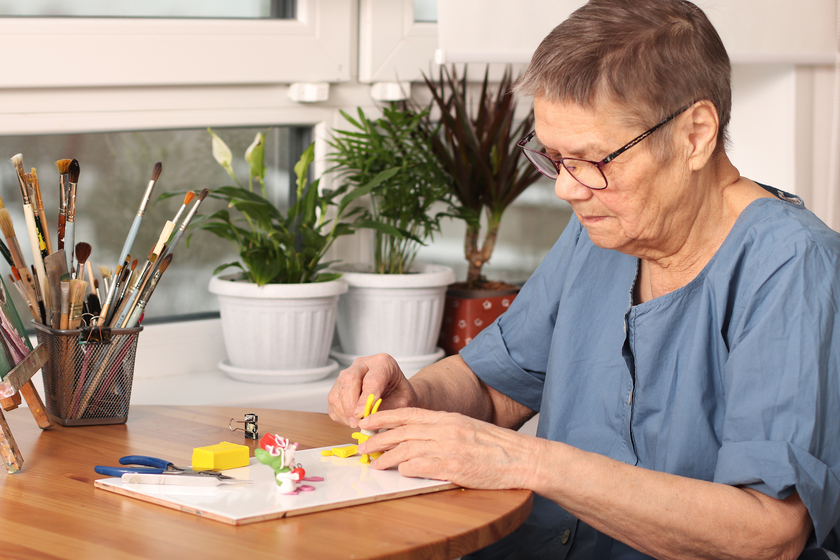Choosing Between Big Facilities and Small Memory Carehomes Charlotte
Choosing Between Big Facilities and Small Memory Carehomes Charlotte
Blog Article
All Regarding Memory Treatment Solutions: Why Small Memory Care Houses Are a Wonderful Choice
Memory treatment services play a crucial role in supporting people with Alzheimer's and mental deterioration. Small memory care homes attract attention for their personalized technique and intimate setup. With reduced staff-to-resident ratios, these homes foster more powerful connections and tailored care. Homeowners gain from boosted social communications and a secure atmosphere. As families explore options, understanding the one-of-a-kind benefits of tiny memory care homes ends up being crucial. What variables should be considered when selecting the best home?
Understanding Memory Treatment Solutions
While numerous might be acquainted with general senior care options, comprehending memory care solutions is essential for families dealing with the challenges of cognitive decrease. Memory treatment specifically accommodates individuals with conditions such as Alzheimer's condition and various other types of dementia. These services supply a structured environment that concentrates on enhancing the high quality of life for locals via specialized treatment and support.Memory treatment centers are made to assure safety and security and safety and security, commonly including protected environments to avoid wandering. Trained team participants are available all the time to help with day-to-day tasks, medicine monitoring, and individual care. Additionally, memory treatment programs commonly include cognitive excitement activities, tailored to involve citizens and promote psychological health. Family members can gain from understanding these solutions, as they make it possible for informed choices concerning their loved ones' care, guaranteeing that their specific requirements and preferences are resolved in a caring and supportive manner.
The Advantages of Little Memory Treatment Homes
Tiny memory care homes provide distinct advantages that can substantially boost the high quality of life for locals with cognitive disabilities. One considerable advantage is the intimate environment, which enables for tailored interactions amongst personnel and residents. This smaller setting fosters meaningful relationships, lowering feelings of seclusion and anxiety typically experienced by people with memory issues.Additionally, the lower staff-to-resident ratio in little memory treatment homes allows caretakers to give even more attentive supervision and support. This technique not only improves safety and security yet also promotes a complacency for the residents.Moreover, small memory treatment homes can adapt quickly to the one-of-a-kind needs and choices of each resident, permitting a much more homey atmosphere. Such an environment can encourage social interaction and engagement in activities, inevitably enhancing the day-to-day experiences of those living with cognitive impairments.
Personalized Treatment Plans for Homeowners
Personalized care strategies are important in memory treatment homes, as they deal with the special demands and choices of each citizen. These plans start with complete evaluations carried out by competent specialists, who evaluate cognitive capabilities, case history, and individual interests. This tailored technique assurances that care is not only effective however likewise respectful of each individual's self-respect and autonomy.Moreover, individualized treatment plans are flexible, permitting changes as locals' requirements evolve gradually. This adaptability cultivates a feeling of protection and experience, which is necessary for people coping with memory obstacles. Caregivers are educated to carry out these plans constantly, giving assistance that lines up with the citizens' routines and preferences.Ultimately, individualized treatment plans enhance the lifestyle for homeowners by promoting involvement, wellness, and self-reliance, making them a fundamental facet of memory treatment services in tiny memory care homes.
Creating a Home-Like Atmosphere
Developing a home-like environment is essential for promoting comfort and familiarity in memory care setups, as it significantly affects homeowners' emotional well-being. Small memory treatment homes commonly focus on customized touches, such as cozy shade combinations, household photos, and familiar furnishings plans, which help homeowners really feel much more at convenience. Incorporating elements reminiscent of a standard home, like relaxing space and communal locations, motivates a sense of belonging.Moreover, making use of natural light and outdoor spaces can boost the ambience, promoting leisure and harmony. Staff members play a significant function in preserving this environment by involving with residents in a compassionate fashion, treating them like family members. Routine tasks, such as cooking or horticulture, can also add to a home-like feel, using chances for residents to join meaningful experiences. On the whole, creating a supporting setting sustains cognitive feature and emotional stability, making it an essential facet of memory care solutions.
Improved Social Communication and Area
Improved social communication and community are essential parts of memory care services. By promoting individualized social interaction and creating a family-like atmosphere, these services promote significant links among homeowners. Team events and activities internet further urge participation, helping people feel extra included and supported.
Personalized Social Engagement
While social interaction is crucial for general well-being, many people with memory disabilities typically battle to engage meaningfully with others. Personalized social interaction in memory care homes addresses this obstacle by you can check here developing tailored activities that cater to homeowners' one-of-a-kind rate of interests and capacities. By concentrating on individual choices, caretakers can cultivate connections that resonate deeply with each person. Tasks such as art treatment, songs sessions, and guided discussions advertise cognitive stimulation and psychological expression. Furthermore, little group setups urge camaraderie and enable even more intimate interactions, enhancing feelings of belonging. This technique not just combats feelings of seclusion but also empowers locals to keep a feeling of identification, eventually adding to boosted psychological health and high quality of life.
Family-like Atmosphere
In a memory treatment setting, cultivating a family-like atmosphere considerably boosts social communication and develops a sense of community amongst locals. Smaller sized memory treatment homes often prioritize intimate settings, allowing residents to create closer links with each other and personnel. This nurturing ambience advertises trust, which is necessary for people with memory disabilities. Citizens are more probable to involve in discussions and share experiences, producing a supportive network that alleviates sensations of loneliness. The knowledge of common rooms and regimens adds to a sense of belonging, further urging social interaction (personalized memory care). In such setups, emotional bonds flourish, leading to improved overall well-being and a better of life for residents as they navigate their daily experiences with each other
Group Activities and Events

Safety and Protection Functions in Small Homes
Numerous tiny homes made for memory treatment integrate crucial safety and protection attributes to assure the health of residents. These homes frequently make use of secure entry and departure indicate protect against straying, an usual issue among individuals with memory impairments. In addition, monitoring systems and alarm system mechanisms boost tracking, ensuring that personnel can immediately respond to any unusual activities.Interior layouts are tailored for safety, with decreased hazards such as sharp corners and clutter-free paths. Handrails top article and non-slip floor covering are usually mounted to decrease the risk of drops. Team member are learnt emergency methods, ensuring they are gotten ready for numerous situations.Moreover, customized care strategies may include assessment of private safety and security needs, providing tailored services for each citizen. On the whole, these safety and security features produce a nurturing setting where citizens can flourish while keeping their self-respect and independence.
Just how to Choose the Right Memory Treatment Home
Just how can families assure they pick one of the most ideal memory care home for their loved ones? The decision requires careful consideration of several variables. Families should assess the facility's personnel credentials and training, making sure that caretakers are experienced in taking care of memory-related problems. Next off, it's vital to evaluate the home's environment, concentrating on security features and whether it cultivates a feeling of community and belonging. Going to the facility can provide understanding into everyday tasks and the social environment, which are necessary for psychological stimulation and psychological well-being. Additionally, family members ought to ask about the care strategies used, ensuring they are customized to specific demands. Taking into consideration the home's place and access for family members gos to can add to a smoother change. By attending to these aspects, households can make an enlightened decision that prioritizes their loved one's convenience and quality of life in a memory care setting.
Often Asked Questions
What Qualifications Should Team Members in Memory Care Residences Have?
Employee in memory treatment homes must possess pertinent accreditations, experience in mental deterioration care, solid communication skills, and concern. Recurring training in behavioral management and restorative treatments enhances their ability to support residents successfully.
How Do Memory Treatment Solutions Differ From Conventional Assisted Living?
Memory care services concentrate especially on individuals with memory problems, offering customized assistance and structured atmospheres. In contrast, typical assisted living supplies basic help with daily activities, lacking the tailored method required for those with cognitive challenges.
What Sorts of Activities Are Used in Memory Care Houses?
Memory care homes commonly provide a range of activities created to engage homeowners. Usual options consist of art therapy, songs sessions, cognitive video games, physical workouts, gardening, and social events, all focused on boosting wellness and cognitive function.
Can Homeowners Bring Their Own Personal Belongings to Memory Care Residences?
Citizens can commonly bring their own personal belongings to memory care homes, allowing them to personalize their home - personalized memory care. This practice assists produce an acquainted setting, advertising comfort and a feeling of identity for the individuals

How Are Relative Involved in the Care Refine?
Member of the family play a crucial role in the treatment procedure, commonly joining decision-making, participating in treatment meetings, and giving psychological assistance. Their involvement fosters a joint setting, enhancing the local's total well-being and lifestyle. While several might be familiar with general senior care alternatives, comprehending memory treatment solutions is important for households dealing with the obstacles of cognitive decline. These services give a structured atmosphere that focuses on enhancing the top quality of life for citizens via specialized care and support.Memory care centers are designed to ensure safety and security and safety and security, commonly featuring protected atmospheres to avoid wandering. Customized care strategies are vital in memory treatment homes, as they provide to the special needs and choices of each homeowner. Personnel members in memory treatment homes need to have relevant accreditations, experience in dementia treatment, strong interaction skills, and concern. Memory care services concentrate particularly on people with memory impairments, supplying customized support and structured environments.
Report this page